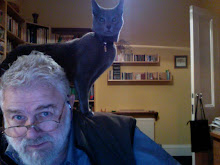Caro writes
"Oh yes, I might like that [to become an author]. In the meantime I have a query. Someone has asked on another forum when the style of writing 'shippe' for 'ship' and 'beste' for 'best' etc stopped. We have been reading an historical document (you prefer a historical document, don't you?) from about 1575 and it uses these longer forms."
Friday, 8 July 2011
Subscribe to:
Post Comments (Atom)




I've looked though my books, Caro, and think I have some sort of answer.
ReplyDeleteIf you have access to the OED, you can see that virtually all of the quotes with shippe or beste spellings are from before 1600. However, there are quotes with ship and best spellings from soon after 1500.
It's broadly true that the words had two syllables when the spelling with e was common, and that they lost the final vowel sound in the course of the sixteenth century.
[Ship is a bit more complicated, but most accents most of the time seem to have had the pronunciation represented by shippe at the start of the century and the pronunciation represented by ship at the end.]
I think you were alluding to David Crustal's other big book The Cambridge Encyclopedia of the English Language. Sure enough, he paints a picture of the chaotic spelling practices in the first century of printed English:
The printers were blamed for a variety of reasons. Many of them were foreigners who introduced their native conventions at will, and who were uncertain of orthographic traditions in English. Proof-reading was not always carried out by educated people, so that errors were promulgated. Because there was only a limited amount of type, arbitrary spellings were often introduced. And arbitrariness also crept in when printers altered spelling (such as adding or deleting an final --e in order to make a line of words end neatly at the right-hand margin.
It is difficult to evaluate the justice of these charges, in the absence of explicit statements from the printers, or detailed studies of the way orthographic consistency developed in their books. It should be borne in mind that several of the critics had an axe to grind, in the form of their own system of reformed spelling or method of teaching. But there is no doubt that, throughout the early decades of the 17th century, the English writing system was widely perceived to be a mess. Although many authors wrote with fair consistency in systems of their own devising, there was no recognisable standard.
I forgot to include a link to David Crystal's book.
ReplyDeleteAnother clear account is in A History of English Language Teaching by APR Howatt.
Tony (as he's known in the EFL trade) summarises a picture of the spelling crisis in the previous History of English Spelling by DB Scrag:
As Scragg points out, what the printing houses wanted was a system of spelling that the customer would recognise as a public standard in printed books. With so many variants in use, there was always a danger that spellings would go in and out of fashion, which would be bad for business. ... However, although the printers were pressing for public uniformity, they continued to use spelling variants when they were technologically convenient. If, for example, a word like bad could be spelled in a short form (bad) and a long one (badde), they would choose the former to avoid line-breaks and the latter to fill out a line to meet a right-hand margin.
Crystal in his Encyclopedia and in his wonderful The Stories of English describes various proposals for spelling reform in the period before and after 1600. But he singles out two reofrmers for special mention: John Hart and Richard Mulcaster. And Tony Howatt devotes a chapter exclusively to these two.
ReplyDeleteJohn Hart is interesting because he proposed really extreme reforms — much like George Bernard Shaw last century. He wanted every letter to have one value only, and he was scornful of unnecessary letters — shippe and wente would have been especially hateful.
Mulcaster was more pragmatic. He valued 'custom' — not changing the familiar purely for change's sake. He also valued 'reason' and 'sound' — but was more willing to compromise that Hart was.
Mulcaster seems to have been more in tune with the minds of readers and printers. And in 1581 he wrote a book on teaching English grammar to children which became very popular and influential. Tony Howatt reckons that the most substantial of Mulcaster's recommendations was the treatment of final -e
1. after short vowels
ship, bad, bed not shippe, badde, bedde
but retaining double consonants in shipper, padded, bedding
2. after long vowels
swipe, wade, swede with 'silent e'
but losing e in swiping, wader (i.e. not *wadeer)
Other proposals were less successful — such as
• cherrie, suretie for cherry, surety
• lac, duc for lack, duck
Howatt considers that Mulcaster's printers were especially influential: a Huguenot refugee called Vaurtrioller and his apprentice, Richard Field, who took over the business. They tended to ignore his -ie/y and ck/k rules.
All the people I read agree that english spelling was pretty well fixed by 1650.
Thanks very much for that, David. I have passed bits of it on (especially those recommendations of Richard Mulcaster).
ReplyDeleteI see our other board is up and running again.
Cheers, Caro.